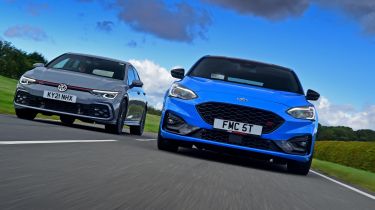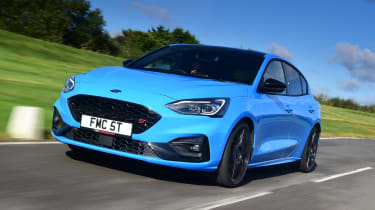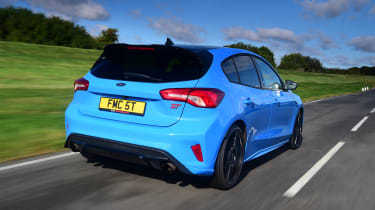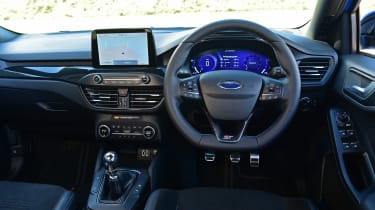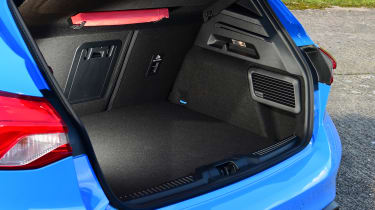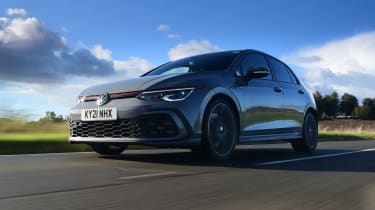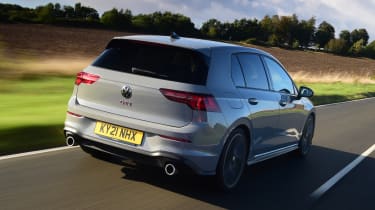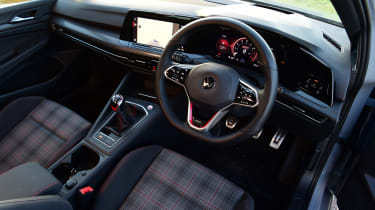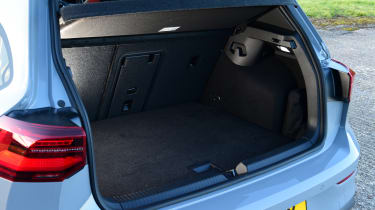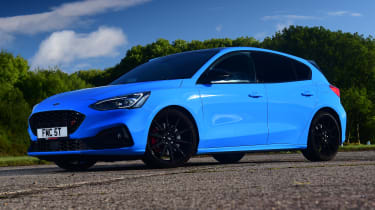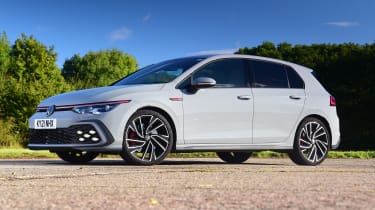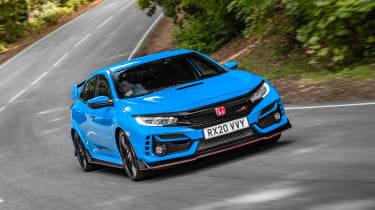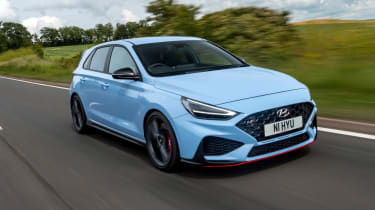Ford Focus ST Edition vs Volkswagen Golf GTI: 2021 group test review
The Ford Focus ST and Volkswagen Golf GTI have been close rivals over multiple generations, can we separate the latest iterations?
Of all the new cars on sale today, hot hatches quite possibly have the hardest job of all. Few cars have to boast such a broad spread of talents; first and foremost, they have to be as fun, exciting and involving as many sports cars, but they need to remain comfortable and easy to drive, not forgetting that they should be spacious and practical enough to carry plenty of people and things, too. Most importantly of all, they need to remain affordable. That last point is a particularly challenging feat when, as with our lead car in this test, some advanced componentry is introduced to bump up the thrills.
Ford has been one of the key players in the hot-hatch game for decades, and while some of its efforts are held
in higher regard than others, nearly all of them are heading towards bona-fide classic status. In its standard form, the current Focus ST has plenty to offer, but to mark the end of its pre-facelift life, Ford has created this ST Edition model, which gains a series of chassis tweaks to lift it onto another level.
One of the few brands to have a greater heritage in the hot hatch game is Volkswagen, and here we’re pitting the Focus head to head with the eighth generation of the iconic Golf GTI. Against the clock, VW test drivers have proved that its latest attempt is quicker than ever, but does that translate into a car that puts a smile on your face on the road? And where does the ST Edition rank in fast Ford folklore?
Ford Focus ST Edition
| Model: | Ford Focus ST Edition 2.3 EcoBoost |
| Price: | £35,785 |
| Engine: | 2.3-litre 4cyl turbo, 276bhp |
| 0-62mph: | 5.7 seconds |
| Test economy: | 32.7mpg/7.2mpl |
| CO2: | 185g/km |
| Annual road tax: | £155 |
The final chapter of the pre-facelift Focus ST is, unsurprisingly, one of the most expensive, too. The ST Edition is priced at £35,785, which is £1,055 more than the Golf GTI tested here – although the VW’s price can easily exceed the Ford’s once a few options have been added.
Used - available now

2024 Vauxhall
Mokka
9,304 milesManualPetrol1.2L
Cash £16,887
2021 Ford
Focus
33,733 milesManualPetrol1.0L
Cash £12,500
2022 Volkswagen
ID.3
26,587 milesAutomaticElectric
Cash £14,900
2024 Volkswagen
Golf GTD
29,886 milesAutomaticDiesel2.0L
Cash £23,200Design & engineering
The Focus ST has flaunted some very distinct characters throughout its four generations. The original ST170 was blessed with a brilliant chassis but lacked firepower when compared with its contemporaries, while the Mk2 Focus ST cured that with a lively five-cylinder turbocharged engine. The third edition came with conventional four-cylinder turbo power, as does the current ST.
The 2.3-litre unit makes a very healthy 276bhp, which is right in the ballpark for the current hot hatch market. Peak torque of 420Nm is also strong, and is available from 3,000-4,000rpm.
However, those stats are all the same as the existing Focus ST; the big changes have been applied to the chassis. Core to the upgrades is the addition of KW coilover suspension. There are new springs – finished in a light blue to match the exterior paint – which are 50 per cent stiffer than standard, while extra control comes courtesy of twin-tube dampers, which can be adjusted 12 ways for compression and 16 ways for rebound. The ride height can be adjusted at both ends, too, 10-30mm lower than the existing ST. New 19-inch wheels reduce unsprung mass by 10 per cent, and they’re wrapped in Michelin Pilot Sport 4 tyres.
Inside, the Edition is set apart from the rest of the ST family, thanks to light blue stitching on the steering wheel, part-leather Recaro seats and gear gaiter. While the driving position feels great, the rest of the cabin doesn’t have the same sense of occasion as the Golf – although there’s little to separate the two when it comes to the quality of the materials.
Driving
The first few yards in the Ford feel almost a little clumsy. The clutch is quite abrupt, as are the brakes, so you need to be both smooth and positive to avoid kangarooing along the road like a nervous learner.
It doesn’t take long to tune into the car’s responses, though, and the lack of slack in the major controls really comes into its own as your speed increases.
That clutch engages with positivity, and is a great match for a gearshift which is more precise than the Golf’s. The brakes seem almost too harsh at low speeds, but a firm, positive pedal inspires plenty of confidence when scrubbing off speed.
And there’s plenty to trim off. At 5.7 seconds, the ST Edition’s 0-62mph time is 0.7 seconds quicker than the Golf’s, and the extra 50Nm of torque in the Ford makes itself felt throughout the rev range. Its engine sounds angry as it builds revs, and the exhaust system pops and barks on full-bore upshifts in the sportier driving modes. By contrast, the GTI sounds a little muted, although a sportier exhaust option solves this to an extent.
However, the Golf can’t come even close to the Focus’s razor-sharp chassis; indeed, few current hot hatchbacks can. The ST’s front end is very responsive and delivers a huge amount of grip, thanks also in part to the brilliant Pilot Sport 4S tyres. So much so, in fact, that it feels like the rear end struggles to keep up.
Push the Focus hard on a track, and it will edge towards oversteer through quick corners, reminiscent of some of the most thrilling old-school hot hatches, albeit in a more predictable manner. Of course, with so much scope for tuning the coilover suspension (albeit manually), it’s possible to dial up a more aggressive or relaxed attitude as the driver sees fit.
Another benefit of the KW set-up is the quality of the adjustable dampers. While they’re undoubtedly firmer than the Golf’s over larger bumps and compressions in the road, they’re able to round off small bumps brilliantly, so the ST Edition doesn’t bounce or fidget uncomfortably like some less sophisticated set-ups. As a result, it’s not a major hardship to live with every day.
Practicality
While these cars aim to thrill on the right road, a hot hatch also needs to be spacious enough to use every day. To that end, the Focus and the Golf are very closely matched.
At 375 litres, the Ford’s boot is almost identical to the Golf’s, while both also benefit from a load-through hatch in the back of their 60:40 folding seat backs, which is ideal for long, thin items such as skis. When it comes to passenger space, the Ford has the edge; there’s little to separate the two for headroom, but the Focus has more generous kneeroom.
Ownership
THE standard Focus was awarded a maximum five-star rating from Euro NCAP when it was tested in 2018. Standard safety kit is generous, too, with adaptive cruise control and lane assist, traffic-sign recognition and blind-spot warning all fitted as standard. The ST also comes with a head-up display; it’s projected on to a little pop-up pane of glass, which isn’t as tidy as the Golf’s set-up, which appears to float ahead of the windscreen, although it’s a £635 option on the VW.
Running costs
Almost without fail, fast Fords and hot Golfs prove to become future classics, meaning that in the long term they are likely to command strong values on the used market. There will still be a strong drop off in the first three years of ownership, though, but it’s the Ford that proves to hold its value better.
Three years after purchase, the ST Edition is expected to be worth 57.4 per cent of its original price, compared with the Golf that will hold on to 52 per cent. In financial terms, that means if you buy either car without options, the Golf will lose £1,142 more of its value in that time.
Testers’ notes
“The Focus ST Edition has a switchable auto-blip mode for the throttle, which means that any driver can downshift as if they’ve nailed the perfect heel-and-toe change every time.”
Volkswagen Golf GTI
| Model: | Volkswagen Golf GTI 2.0 TSI 245 |
| Price: | £34,730 |
| Engine: | 2.0-litre 4cyl turbo, 242bhp |
| 0-62mph: | 6.4 seconds |
| Test economy: | 34.5mpg/7.6mpl |
| CO2: | 168g/km |
| Annual road tax: | £155 |
Before options, the Golf GTI seen here is priced at £34,730, and marks the entry point to the hot hatch line-up. However, adding extras lifts that price higher, with 19-inch alloy wheels (£735), Moonstone grey paint (£385) and Dynamic Chassis Control (£795) bumping the total price to £38,265.
Design & engineering
In 2021, the Golf GTI celebrated its 45th birthday and had racked up two million sales. VW believes that this eighth-generation model has a broader spread of abilities than any version before it, although this has been a key selling point of the GTI throughout its existence.
Under the bonnet, not too much has changed. The GTI is fitted with VW’s 2.0-litre turbo petrol engine, which has been seen in so many VW Group performance models, including the previous GTI. Although in some applications it makes more than 300bhp, here it’s pegged back to 242bhp. While it has a smaller capacity and is 34bhp down on the Ford, peak power and torque figures are available across a broad rev range. There’s 370Nm available from just 1,600rpm all the way to 4,300rpm. A six-speed manual gearbox is fitted here, but buyers can also opt for a seven-speed dual-clutch auto.
The chief gains that this GTI has made over the Mk7.5 version can mainly be put down to tech. Some of it is very clear to see from the driver’s seat. As with the rest of the Golf line-up, the dashboard gets a much cleaner look than before, dominated by a pair of large digital displays. While we’re not entirely sold on the quality of the finish, the overall look is one that is very uncluttered – particularly when compared with the Ford. Throw in the subtle red highlights that are unique to the GTI, plus red ambient lighting, and it does feel like a special place to sit.
Under the skin the Golf GTI uses the same MQB platform as its predecessor, but a new electrical system ties together the mechanical locking differential and, where fitted, adaptive dampers. It’s called the Vehicle Dynamics Manager, and the brand claims that it makes the GTI even more agile.
Our test car was fitted with the £795 adaptive dampers. They allow the driver to choose from a sliding scale of 15 response rates via the car’s touchscreen. Sport mode is the fourth firmest setting and VW’s engineers claim that this point is the quickest for track driving; the three stiffer settings simply make the car feel livelier, rather than improving its performance against the stopwatch.
Driving
Those dampers give the GTI a very diverse set of abilities on the road. In their softest setting, the ride comfort is as agreeable as in any regular Golf. As performance cars go, they make the GTI incredibly easy to live with every day. It’s an excellent motorway cruiser, too; long distances can be covered without the smallest hint of stress. They’re a huge improvement on the passive set-up; if we had to pick only one optional extra for the GTI, it would be this.
Move the slider to its opposite end, and at their firmest the dampers begin to reveal their lack of sophistication compared with the Ford’s. While their control could never be described as harsh, the GTI is certainly a little bouncier at low speeds. But it’s at speed where they truly show their deficiencies.
Where the Focus comes alive, the Golf feels lethargic. Turn-in feels numb and lazy, while mid-corner bumps that the ST easily shrugs off will upset the GTI’s balance much more. The car’s differential is excellent and hauls the Golf out of tight turns with superb traction, although the ST’s is more aggressive still. By the standards of most road cars, the GTI is still a capable and very quick machine, but in the company of one of the best hot hatch chassis around, it doesn’t feel as sharp.
It’s the same for the other major controls, too. In contrast to the Focus’s brakes, the VW’s feel soft – but they’re easier to modulate at low speeds.
Practicality
Beyond the most obvious metrics for cabin and boot space, this pair are fairly evenly matched. The Golf wins points courtesy of its large smartphone shelf complete with folding lid to secure it in place, while there are two large cup-holders in the centre console and deep door bins in the front – all of which are slightly more generous than the ones found in the Ford.
If you want to carry three passengers in the back, however, the Focus is the better bet. Its centre seat is wider and flatter, while there is less of a hump in the middle of the floor, so there’s more foot space.
Ownership
For overall after-sales satisfaction, there won’t be much of a gap between these two. Ford’s dealers bagged a middling 12th-place finish in our latest Driver Power survey, beating VW in 16th. The roles were reversed for the firm’s cars; VW finished 17th, but Ford took a disappointing 25th out of 29 brands.
As with the Focus, the Golf scored a five-star Euro NCAP rating – one year later in 2019. Standard safety tech includes adaptive cruise control, auto emergency braking with pedestrian and cyclist detection, road-sign recognition, lane-change assist and parking sensors all round. The Golf also features Car2X software, a system which allows it to communicate with other equipped vehicles to warn of hazards.
Running costs
As with any performance car, real-world fuel consumption will depend very much on how it’s driven. Officially, the VW is more frugal than the Ford; its WLTP-certified 38.2mpg tops the Ford’s 34.9mpg. Both came close
to these figures during our drives, with the GTI still beating the Ford 34.5mpg to 32.7mpg. That means the Golf will cost £3,782 for 20,000 miles of driving at today’s prices, while the Focus will cost £208 more.
Testers’ notes
“The original Golf GTI famously sported a golf ball-style gearknob. This latest version’s dimpled design nods to the original, but its squared-off shape isn’t as pleasing to use.”
Verdict
First place: Ford Focus ST
The epilogue to the pre-facelift Focus Mk4 shows the ST in its very best light. Its razor-sharp handling is thrilling, and while there isn’t any extra performance, it’s still not short of straight-line speed either. Overall, the Golf is a little easier to live with every day, but the Ford is far from unbearable, so we’d gladly trade the last word in refinement for a big step up in excitement.
Second place: Volkswagen Golf GTI
It comes second here, but the GTI’s position very much depends on your finance choice. If you go with a PCP or cash purchase, then the keener, more involving Focus is the better (and slightly cheaper) buy. Choose to lease, however, and the Golf is much better value. Find a deal that suits you and the GTI could be a brilliant choice but, on balance, the ST Edition takes the win.
Also consider...
Honda Civic Type R
- Price: £34,415
- Engine: 2.0l 4cyl turbo, 316bhp
A replacement is due soon, but the current Type R remains king of the front-drive hot hatchbacks. Styling aside, it’s one of the finest examples of the breed, with a fantastic chassis and manual gearbox – but you’ll have to buy one from stock.
- Price: £33,745
- Engine: 2.0l 4cyl turbo, 276bhp
Under the supervision of ex-BMW man Albert Biermann, Hyundai’s first hot hatch has been a hit. The N isn’t quite as polished or refined as the Golf GTI, but it has bags of character. Strong value for money makes it all the more tempting.
Figures
| Ford Focus ST Edition 2.3 EcoBoost | Volkswagen Golf GTI 2.0 TSI 245 | |
| On the road price/price as tested | £35,785/£35,785 | £34,730/£38,265 |
| Residual value (after 3yrs/36,000) | £20,526/57.4% | £18,063/52.0% |
| Depreciation | £15,259 | £16,667 |
| Annual tax liability std/higher rate | £2,578/£5,156 | £2,484/£4,968 |
| Annual fuel cost (12k/20k miles) | £2,394/£3,990 | £2,269/£3,782 |
| Insurance group/quote/VED | 34/£903/£155 | 28/£559/£155 |
| Cost of 1st/2nd/3rd service | £574 (3 years) | £386 (2 years) |
| Length/wheelbase | 4,378/2,700mm | 4,287/2,627mm |
| Height/width | 1,471/1,848mm | 1,478/1,789mm |
| Engine | 4cyl turbo/2,261cc | 4cyl turbo/1,984cc |
| Peak power/revs | 276/5,500 bhp/rpm | 242/5,000 bhp/rpm |
| Peak torque/revs | 420/3,000 Nm/rpm | 370/1,600 Nm/rpm |
| Transmission | 6-spd man/fwd | 6-spd man/fwd |
| Fuel tank capacity/spare wheel | 52 litres/space saver | 50 litres/repair kit |
| Boot capacity | 375 litres | 374 litres |
| Kerbweight/towing weight | 1,432/1,100kg | 1,429/1,600kg |
| Turning circle | 11.0 metres | 10.9 metres |
| Basic warranty/recovery | 3yrs (60,000)/1yr | 3yrs (60,000)/1yr |
| Driver Power manufacturer/dealer pos | 25th/12th | 17th/16th |
| NCAP: Adult/child/ped./assist/stars | 96/87/72/75/5 (’18) | 95/89/76/78/5 (’19) |
| 0-62mph/top speed | 5.7 secs/155mph | 6.4 secs/155mph |
| Actual economy (mpg/mpl)/range | 32.7/7.2/374 miles | 34.5/7.6/379 miles |
| WLTP combined | 34.9mpg | 38.2mpg |
| WLTP combined | 7.7mpl | 8.4mpl |
| Claimed/actual CO2/tax bracket | 200/185g/km/37% | 189/168g/km/37% |
| Airbags/Isofix/park sensors/camera | Six/yes/yes/yes | Six/yes/yes/£300 |
| Auto box/lane keep/blindspot/AEB | No/yes/£400/yes | £1,520/yes/yes/yes |
| Climate control/cruise control | Yes/adaptive | Yes/adaptive |
| Leather/heated seats | Part/yes | £2,130/£485* |
| Metallic paint/LED headlights | No/yes | £645/yes |
| Keyless entry & go/power tailgate | Yes/no | Yes/no |
| Sat-nav/digital dashboard | Yes/yes | Yes/yes |
| DAB radio/connected services | Yes/yes | Yes/yes |
| Wireless charge/CarPlay/Android Auto | £125/yes/yes | Yes/yes/yes |
